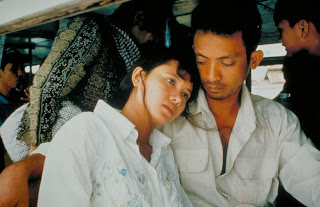One Evening After the War (1998)
In 1992, over twenty years of war in Cambodia came to an end. King Sihanouk returned to the country, and the first free elections in decades were held. Savannah, who has known nothing but war his whole life, returns from the front where he had been fighting the Khmer Rouge insurgency to a Phnom Penh transformed into a glittering mass of neon signs and all-night bars. Moving in with his grandmother and uncle, his only surviving relatives, Savannah refuses to give into a life of crime, and struggles to get by working odd jobs, and boxing. Savannah falls in love with the bargirl, Srey Poeuv, who works at a nightclub his friend from the army is a bouncer at. The two fall in love, but poverty intercedes, and an inevitable tragedy is in the works. Above all, One Evening After the War is a melancholy of a portrait of a people who have lost everything except for hope. At times it recalls the dramas of Dang Nhat Minh and Tranh Anh Hung, but Rithy Panh's style eschews melodrama and overt stylization for a more down-to-earth and realistic approach to the subjects, but his film is no less poetic and romantic. His Cambodia is one inhabited by the wandering living dead, people struggling to make sense of what has happened to them, and somehow to make it into the new world they supposedly have been given. Near the end, the lovers release their birds into the sky, imbibing them with their hopes for a new tomorrow. That tomorrow they hope so dearly for never comes, but life goes on. So is the way of the world.


Comments
Post a Comment